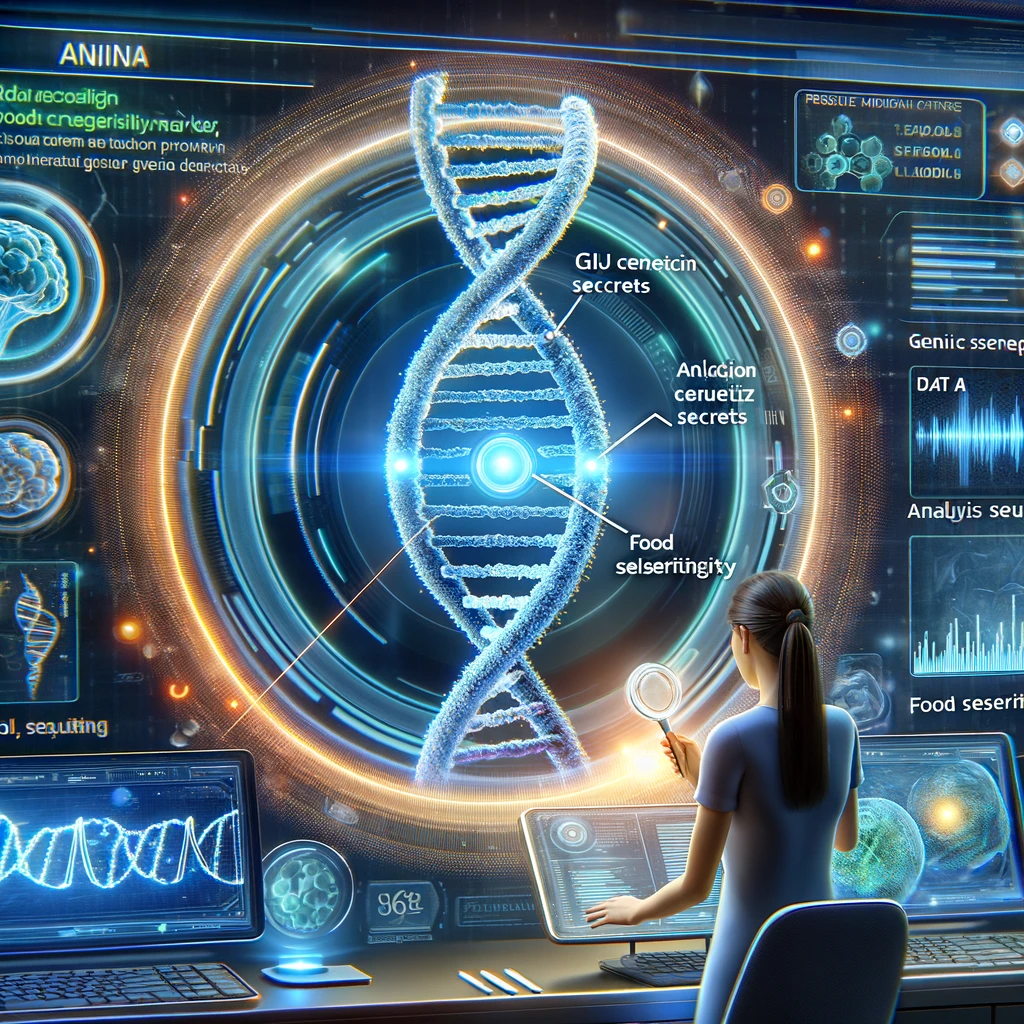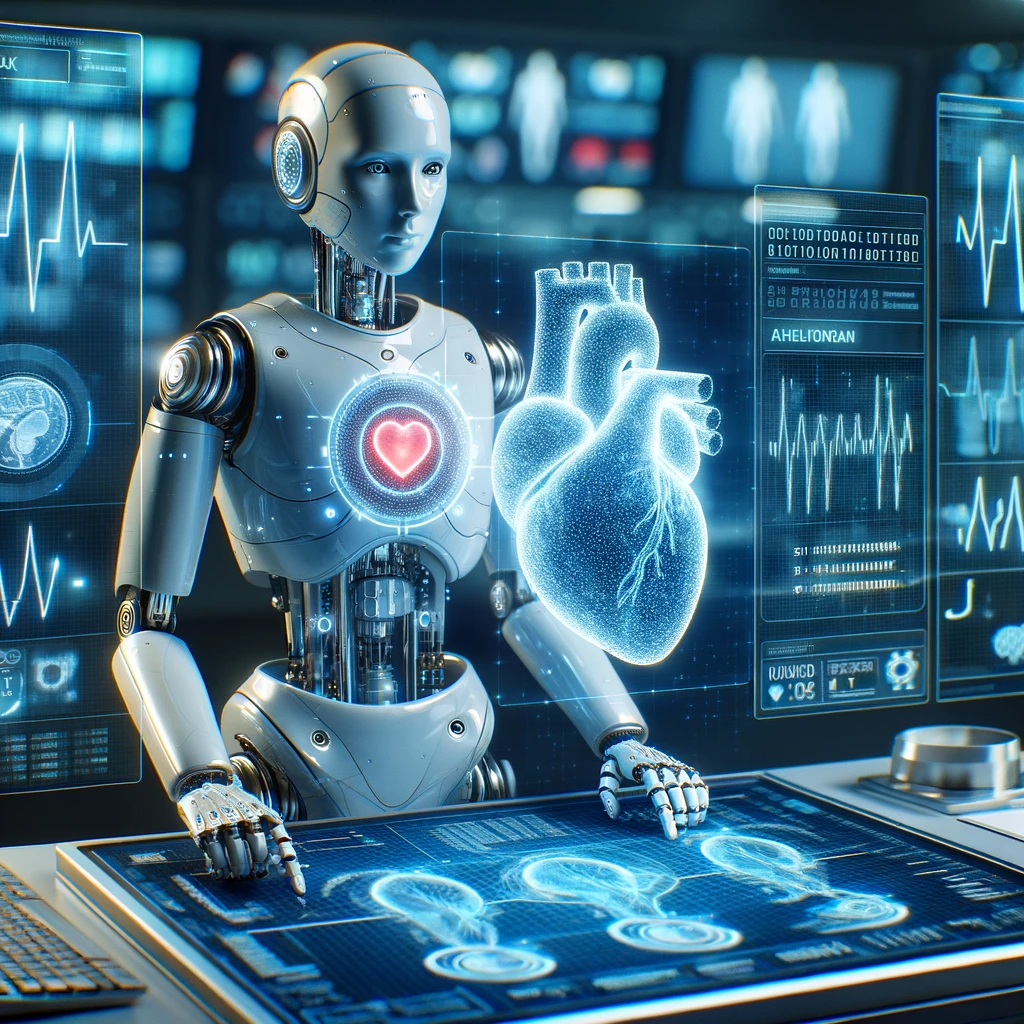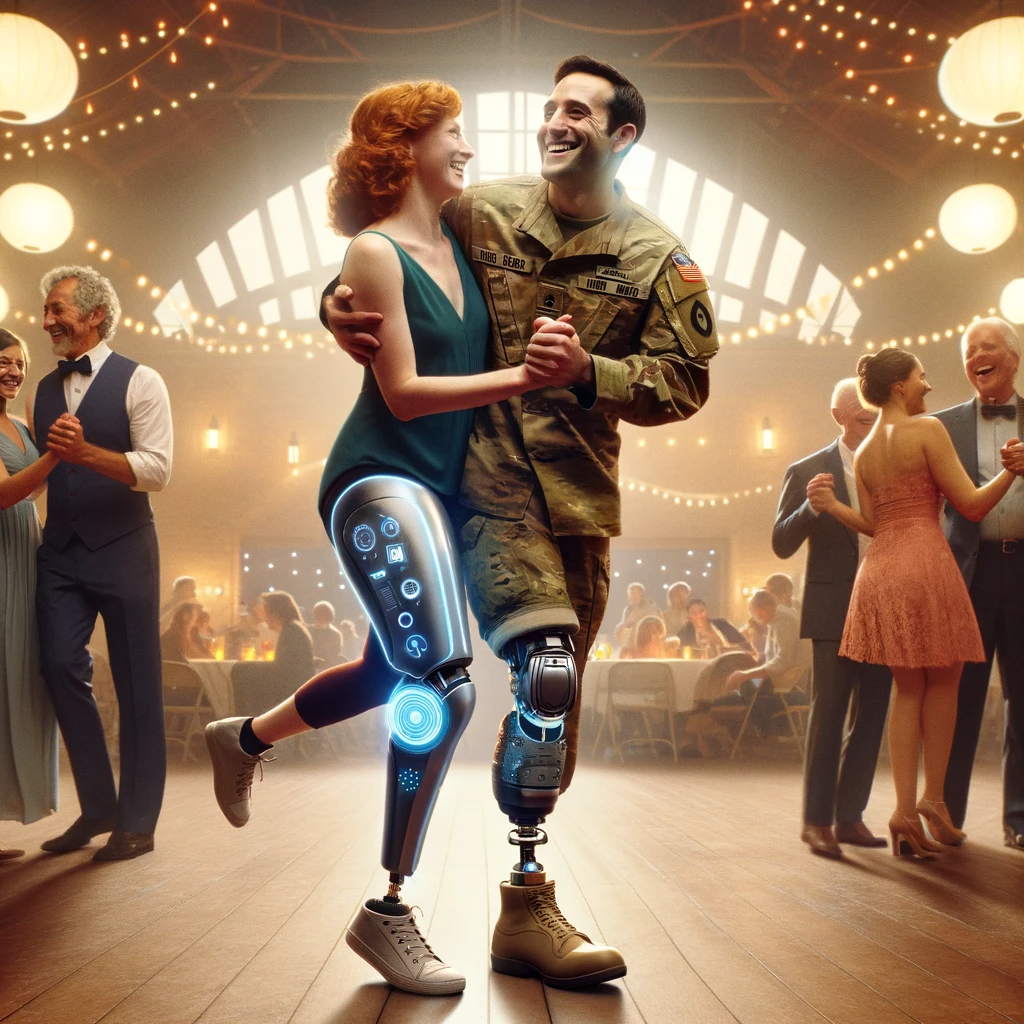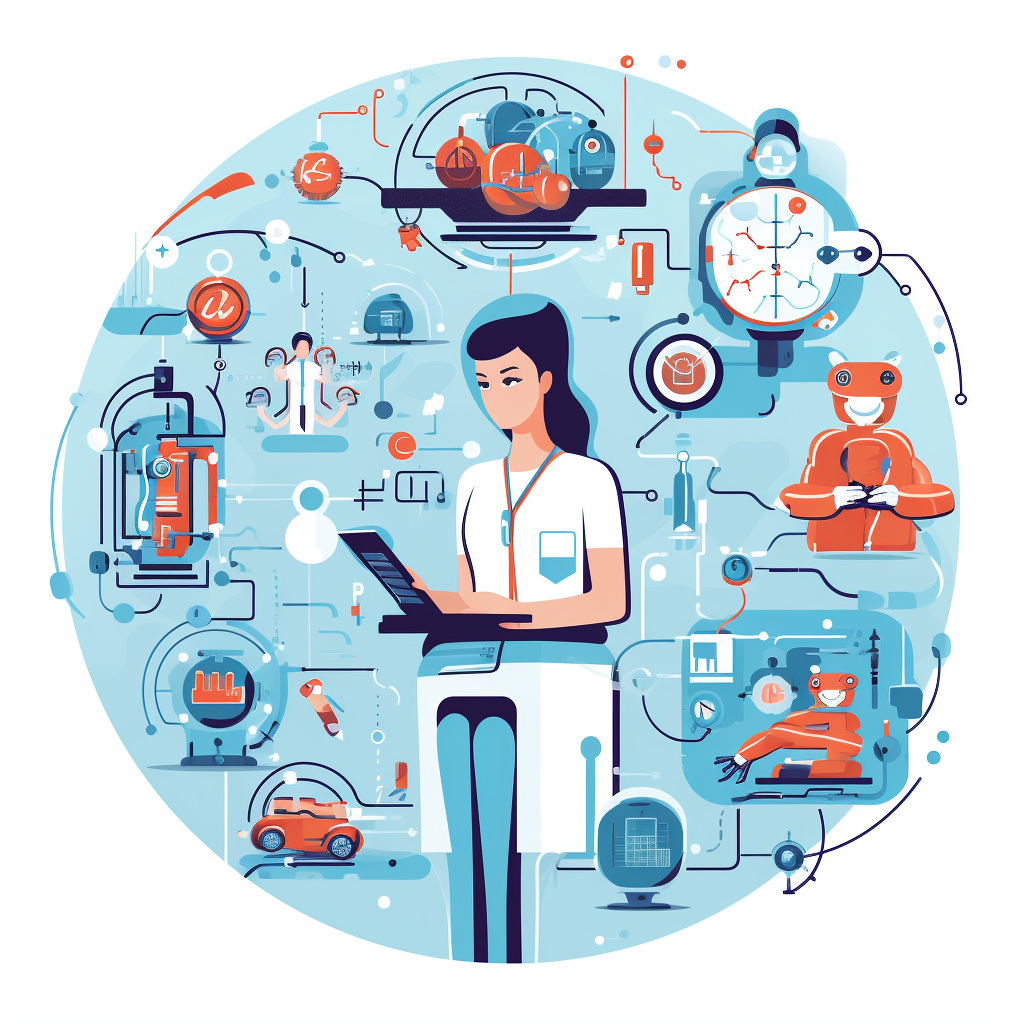Table of Contents
Introduction
Dive into transformative tales of AI in healthcare, uncovering breakthroughs and real-life impacts on medical practices and patient care!
1. X-Ray: Snapshots of the Inside
You’ve probably encountered an X-ray machine at least once, be it for a fractured bone or a dental check-up. Imagine making those X-rays smarter! With the help of Artificial Intelligence (AI), these machines are now turbocharged to give doctors enhanced visions of what’s inside our bodies. Not just clearer images, but AI can spot abnormalities that might sometimes be missed by the human eye. For instance, consider Jenny’s story. She went for a routine check-up, and the AI-enhanced X-ray system detected a minor health concern that would’ve been hard to spot otherwise. Acting on this early alert, her doctor devised a preventive plan, potentially saving her from future complications. It’s like having a super-smart assistant for doctors. The next time you’re under that X-ray machine, remember there’s an intelligent layer to it, ensuring nothing is overlooked!
2. Robots in the Operation Room

It’s no longer a scene from a futuristic sci-fi movie. Today, robots are actively participating in operating rooms around the world, making surgical procedures safer and more precise. Think of it this way: it’s like having an incredibly skilled assistant with the ability to move with unparalleled accuracy, helping the surgeon perform their tasks. These robots can’t get tired or shaky, allowing for pinpoint precision in delicate operations. For instance, the da Vinci Surgical System, one of the pioneering robotic assistants, provides surgeons with an advanced set of tools to use in minimally invasive procedures. The robot doesn’t act alone – it’s controlled by the surgeon from a console. This blend of human expertise and robotic precision is revolutionizing medical outcomes. It’s a mesmerizing dance of technology and human skill, changing the face of modern medicine. Cool, right?
3. Quicker Medicine Discoveries
Artificial Intelligence (AI) is transforming more than just daily gadgets; it’s crucial in developing new medicines. Take the recent surge in vaccine creation for pandemics. Traditionally, this process could span decades, but AI lets scientists quickly parse data, predict compound impacts on health, and identify top vaccine candidates. The rapid development of recent vaccines for pressing health crises? AI-driven algorithms were key, analyzing biological data to help researchers. Often, AI is behind medical science breakthroughs.
4. 24/7 Health Watch
In today’s digital age, the boundary between doctors and patients has transformed dramatically, all thanks to the power of AI. Imagine a situation where, regardless of the distance, doctors can monitor their patients just as if they’re right beside them. Picture it: It’s like a doctor having a movie marathon, but the film’s star is you! With AI-driven wearable devices, real-time data about a patient’s heart rate, sleep patterns, and even oxygen levels can be sent directly to medical professionals. If anything seems off, the system alerts the doctor immediately, allowing for prompt intervention. This continuous health watch ensures that patients receive timely care, even without being in the hospital. It’s not just about convenience; it’s about ensuring health and safety round the clock. With AI, medical care truly never sleeps!
5. DNA Secrets, Revealed

Dive into the groundbreaking world of AI as it unravels the mysteries buried in our DNA. Utilizing advanced algorithms and vast data banks, Artificial Intelligence is now capable of identifying potential health risks, sensitivities, and even predicting genetic conditions that we might be predisposed to. Take the case of Anna: she had always faced unexplained health issues. However, when she used an AI-powered DNA analysis tool, it pinpointed a specific food sensitivity she wasn’t aware of. Based on this revelation, Anna revamped her diet, resulting in noticeable improvements in her well-being. Such individualized insights, stemming from AI’s deep dive into our genetic makeup, are revolutionizing personalized healthcare. Beyond just reading our genetic code, AI provides actionable insights, guiding us towards healthier lifestyles tailored just for us.
6. Mental Health’s New Bestie
In today’s fast-paced world, our mental well-being is as important as our physical health. AI is playing an increasingly pivotal role in understanding and aiding our emotional states. These smart tools can discern subtle cues, indicating stress or sadness, and suggest ways to lift our spirits. Take the case of our friend Sam. Recently, after facing some personal challenges, he felt a consistent cloud of melancholy. That’s when he discovered an AI-powered mental health tool. Instead of dismissing his feelings, the AI platform provided therapeutic activities, meditation guides, and even uplifting music tailored for him. Not only did it offer immediate solace, but it also assisted Sam in tracking his mood patterns and provided coping strategies. Such advancements show that AI isn’t just about cold calculations; it’s also about understanding and caring for the human heart.
7. Detecting Heart Issue:

Imagine a system that listens to heartbeats like a doctor with a stethoscope. This is AI in healthcare today. AI can now identify heart conditions by analyzing heartbeat sounds, recorded on devices as common as smartphones. The AI examines the audio for irregular patterns, detecting issues from murmurs to heart failure risks. It gives a fast, non-invasive analysis, fitting perfectly into telemedicine, and making heart checks accessible from home.
8. Brain Imaging:
Brain imaging, like MRI and fMRI, allows doctors to see inside the brain, identifying active areas during tasks and detecting conditions like tumors or injuries. PET scans further aid in uncovering functional abnormalities, guiding early diagnosis and treatment for brain-related health issues.
9. Hospital Staffing Burnout:
Artificial Intelligence (AI) is transforming hospital staffing, helping fight staff burnout. AI algorithms predict patient arrivals, letting hospitals adjust staff numbers in advance. This prevents healthcare workers from being overburdened during busy periods and underutilized during slower times. AI also monitors work patterns to improve shift schedules and prevent overwork, ensuring staff rest. By evaluating patient feedback and staff interactions, AI pinpoints stress or inefficiency, aiming to foster a balanced work environment that values patient care and staff well-being. AI’s strategic use showcases its promise in revolutionizing healthcare.
10. Smart Prosthetics: New Life, New Limb

“Smart Prosthetics: New Life, New Limb: The power of AI is revolutionizing the world of prosthetics, offering a ray of hope and functionality to those who’ve lost a limb. Gone are the days of static and rigid prosthetics. Today, with the integration of AI, prosthetics can mimic natural movements by analyzing the user’s residual muscle signals. Take war veteran Max, for instance. After a devastating injury left him without a leg, Max never imagined he’d dance again. But thanks to his AI-driven prosthetic leg, not only has he regained mobility, but he’s also back on the dance floor, swinging to the rhythms with grace and confidence. AI-powered prosthetics are more than just replacements; they’re extensions that are restoring dreams and rewriting destinies.”
11. Your Pocket Health Pal:
Ever found yourself feeling a little off but weren’t sure if it’s worth a trip to the doctor? With advancements in AI, you no longer have to wonder. Imagine having a mini-doctor right within your smartphone, ready to assist at a moment’s notice. Whether you need a quick reminder to take your meds, guidance on home remedies for that stubborn cold, or an analysis of your sleep patterns, AI’s got you covered. It’s like having a 24/7 health companion that provides advice, tracks your wellness, and even offers fitness tips tailored just for you. No more second-guessing or late-night Google searches about symptoms. With AI, expert health advice is always at your fingertips, making your wellness journey smoother and more informed. Embrace the future where technology ensures you’re always in tune with your health.
12. Personal Health Plans
In today’s digital age, personalized treatment is not just a luxury but a necessity. Imagine walking into a healthcare facility, and instead of receiving generic advice, you’re presented with a health plan tailored precisely to your needs, history, and genetic makeup. This is the magic of Artificial Intelligence (AI) in healthcare. Think of it like customizing a burger. You wouldn’t want a pre-made one with toppings you dislike. Instead, you’d want one with all your favorite ingredients, prepared just the way you like it. Similarly, AI studies your medical history, genetic information, lifestyle, and even preferences to curate a health regimen that’s perfect for you. No more one-size-fits-all; it’s time for care that truly understands and caters to individual needs. With AI, your health journey becomes as unique as you are.
13. Health Predictions

AI’s marvel lies not only in gauging our health but also in foreseeing issues before they surface. Consider Tom, who wears a fitness tracker for his morning runs. One day, the AI-driven device flagged an unusual stride pattern, hinting at a possible injury risk. These forward-looking features extend beyond fitness; health apps with AI sift through our vitals, sleep, and diet to forecast health risks. It’s akin to a digital health sentinel that guards and predicts, nudging us towards preventative care. AI is reshaping our approach to personal health management.
14. Paperless Docs
Gone are the days when we were buried under mountains of paperwork. Now, thanks to Artificial Intelligence (AI), we’re embracing a cleaner, more efficient, and eco-friendly paperless era. Remember the swift, hassle-free hospital exit Aunt May had last summer? It wasn’t magic, but the work of AI seamlessly organizing and retrieving patient records on demand. Consider also the students who now get instant feedback on their assignments, or businesses that track thousands of transactions without a single file cabinet. Even mundane tasks like sorting out old family photos or managing monthly bills have been revolutionized. With AI, everything’s stored, sorted, and just a click away, ensuring we spend less time fumbling with papers and more time on things that truly matter.
Conclusion
Health + AI = Amazing Times Ahead!
From checkups to big treatments, AI’s ensuring top-notch care. It’s all about making health smarter, easier, and so much more fun.
Share Your Thoughts!
Got an AI health story or a fun tech goof-up? Drop it below! Dive in deeper with us into this techy health adventure. And remember – a good chuckle’s great, but AI’s making health even better! 🚀🩺🤖
FAQ for AI in Healthcare
What is AI in healthcare?
AI in healthcare refers to the application of artificial intelligence (AI) technologies to improve healthcare delivery and patient outcomes. AI can be used in a variety of ways in healthcare, including:
- Diagnosis: AI algorithms can analyze medical images, such as X-rays and MRIs, to detect diseases and abnormalities.
- Treatment: AI can be used to develop personalized treatment plans for patients, taking into account their individual health history and genetic makeup.
- Drug discovery: AI can be used to identify new drugs and treatments for diseases by analyzing large amounts of data.
- Patient monitoring: AI can be used to monitor patients’ health remotely and to alert healthcare providers to potential problems.
- Administrative tasks: AI can be used to automate administrative tasks, such as scheduling appointments and processing insurance claims.
How is AI being used in healthcare?
AI is already being used in a variety of ways in healthcare. Some examples include:
- AI-powered medical imaging analysis tools are being used to help radiologists identify suspicious lesions or abnormalities in medical images, such as X-rays, CT scans, and MRIs. This can help to improve the accuracy of diagnoses and lead to earlier treatment for patients.
- AI-driven clinical decision support systems are being used to provide clinicians with real-time recommendations for treatment and care. These systems can help to improve the quality of care and reduce the risk of medical errors.
- AI-powered chatbots are being used to provide patients with information about their health conditions and to answer their questions. This can help to empower patients and improve their engagement with their care.
What are the benefits of using AI in healthcare?
There are many potential benefits to using AI in healthcare. Some of the most potential benefits include:
- Improved accuracy of diagnoses and treatment plans. AI can analyze large amounts of data to identify patterns and relationships that humans may not be able to see. This can help to improve the accuracy of diagnoses and treatment plans.
- Increased efficiency of healthcare delivery. AI can be used to automate many tasks, such as scheduling appointments and processing insurance claims. This can free up healthcare providers to focus on patient care.
- Improved patient outcomes. AI can help to improve patient outcomes by providing personalized care, monitoring patients’ health remotely, and providing real-time clinical decision support.
- Reduced healthcare costs. AI can help to reduce healthcare costs by improving the efficiency of healthcare delivery and by preventing medical errors.
What are the risks of using AI in healthcare?
There are also some potential risks associated with using AI in healthcare. Some of the most potential risks include:
- Bias: AI algorithms can be biased, which can lead to unfair outcomes.
- Privacy: AI systems can collect and analyze a lot of data about people, which raises concerns about privacy.
- Safety: Some AI systems could be used to harm people, either intentionally or unintentionally.
- Overreliance on AI: Healthcare providers may become overreliant on AI and may not use their clinical judgment as much.
- Job displacement: AI could displace some healthcare workers, such as medical coders and transcriptionists.
What are the future of AI in healthcare?
AI is expected to play an increasingly important role in healthcare in the future. Some of the areas where AI is expected to have a major impact include:
- Personalized medicine: AI will be used to develop personalized treatment plans for patients, taking into account their individual health history and genetic makeup.
- Digital health: AI will be used to develop new digital health tools that can help patients to manage their health remotely.
- Precision medicine: AI will be used to develop new precision medicine treatments that target specific diseases or patient populations.
- Medical robotics: AI will be used to develop new medical robots that can perform complex surgeries and provide other forms of care.
- Virtual reality (VR) and augmented reality (AR): AI will be used to develop VR and AR applications that can be used for training, surgery, and patient care.
AI in Healthcare Applications: How is artificial intelligence being used in healthcare?
Artificial Intelligence in healthcare acts like a high-tech helper for doctors and patients. For example, AI can look at X-rays and help find signs of diseases like pneumonia faster than a human can. Also, there are chatbots that act like digital nurses, checking on patients and answering their health questions at any time of the day.
AI in Healthcare Challenges: What are the challenges of using artificial intelligence in healthcare?
One of the big challenges is making sure the AI gets the diagnosis right. If the AI makes a mistake, it could be serious for the patient. There’s also the issue of privacy – patient data is very personal, and keeping that information safe is super important. Plus, doctors and nurses need to learn how to work with this new technology, which can take time.
AI in Healthcare Ethics: What are the ethical implications of using artificial intelligence in healthcare?
Using AI in healthcare brings up questions like, “Should a machine help decide treatment?” and “How do we keep patient data private?” There’s also the concern about bias – if the AI is trained with data that’s not diverse, it might not work the same for everyone, which isn’t fair.
AI in Healthcare Regulation: How is artificial intelligence being regulated in healthcare?
Governments and healthcare organizations are creating rules to make sure AI is safe and effective. This means setting standards for how AI should work and making sure it respects patient privacy. These rules help protect patients and make sure that AI is used in the best way possible.
AI in Healthcare Impact: What is the impact of artificial intelligence on healthcare?
AI is making healthcare more efficient and personalized. It’s helping doctors diagnose diseases earlier and more accurately, which can save lives. AI can also handle routine tasks, so healthcare workers can spend more time with their patients. Overall, AI has the potential to make healthcare better for everyone.
AI in Healthcare Diagnosis Artificial intelligence helps diagnose diseases by looking at medical images like X-rays or MRIs. For example, AI can help spot cancer early by finding tiny tumors in breast mammograms that doctors might miss.
AI in Healthcare Treatment AI creates personalized treatment plans by analyzing a patient’s unique health data. For instance, AI can suggest a specific cancer treatment by understanding the genetic makeup of a patient’s tumor.
AI in Healthcare Drug Discovery AI speeds up the discovery of new drugs by predicting how different chemicals will work in the body. It’s like a super-smart scientist that can quickly tell which new compounds might be effective medicines, without the need for years of lab tests.
AI in Healthcare Patient Monitoring AI monitors patients’ health using devices that track things like heart rate and sleep patterns. For example, a smartwatch with AI might notice changes in a person’s heartbeat that could signal a heart problem, and alert them to see a doctor.
AI in Healthcare Administrative Tasks AI automates routine tasks like scheduling appointments or processing insurance claims. This can mean using chatbots to answer patients’ questions online, so medical staff have more time for patient care.
“AI Evolution: 13 Stages from Rule-Based to Quantum AI!”
Reference:
https://en.wikipedia.org/wiki/Artificial_intelligence_in_healthcare


